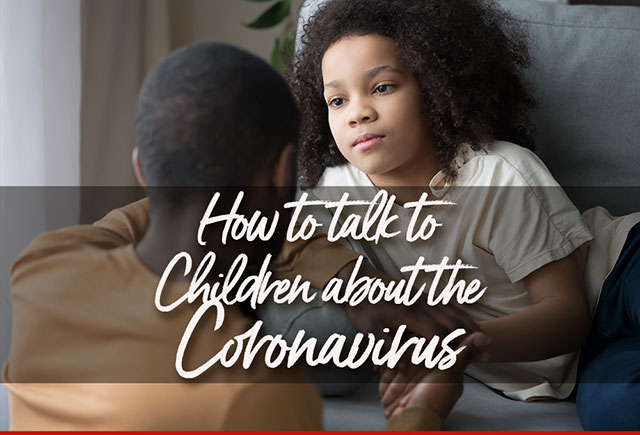
This blog was updated May 3, 2021
If your family watches television at all, there’s no escaping the barrage of media coverage about COVID-19.
How should parents handle the steady stream of messages—some of which are alarming—from fueling fear and anxiety in their children?
A hot-button topic like the coronavirus can spur all kinds of rumors, especially unfounded ones based on misinformation and gossip.
“Rumors are scary,” says Jason Sabo, PhD, a pediatric psychologist with Lee Health Pediatric Behavioral Health. “Especially with children. As the rumors grow unchecked, so can children’s imaginations about contracting the coronavirus, which can make then anxious and fearful.”
Here’s What Parents Can Do
Stay calm. “Parents should check themselves and watch how they respond to the latest fact-based news about the coronavirus,” Sabo says. “Kids mirror the behavior of their parents. Adults should try to remain calm and develop a plan for managing how the family processes the constant stream of media messages. Their children will pick up on their actions.”
Get the facts, tell the truth. Arm your children with the truth about COVID-19 to reduce their fear and anxiety, Sabo says. “Parents should get the facts about coronavirus from creditable sources like the Florida Department of Health, the Centers for Disease Control and Prevention, and Lee Health. What’s key is that children should learn the truth from their parents and not their friends.”
Have a regular chat. Sabo also recommends that parents talk with their children about the coronavirus in a time and place that’s natural to them, like during the dinner hour at the family table.
“Keep it normal instead of holding a separate, formal discussion with them, which will only create more anxiety,” Sabo suggests. “Children receive and interpret information most effectively in familiar situations. You could even have the talk while in the car, like so many conversations we have.”
Follow up. Sabo says after you’ve talked with your child, ask them to summarize the discussion back to you, just to make sure they have and understand the facts.
Maintain healthy habits. Parents should already have good family habits in place. If not, develop good habits and make them become routine. “For example, have your kids develop the habit of washing their hands to the ‘Birthday Song’ when they come inside the house,” Sabo says. “And remind them to sneeze or cough into disposable tissues or into their elbows. These and other health habits should become part of our daily routines. That way, in a time of increased urgency like now, the behaviors are normalized and feel like no big deal to kids. It will help lessen anxiety and fear.”
 Jason M. Sabo, PhD, is a pediatric developmental and behavioral specialist with Lee Health Pediatric Behavioral Health. Sabo has clinical specialty in autism spectrum disorder, attention deficit hyperactivity disorder, behavioral problems, anxiety disorders, mood disorders, violent and aggressive behaviors.
Jason M. Sabo, PhD, is a pediatric developmental and behavioral specialist with Lee Health Pediatric Behavioral Health. Sabo has clinical specialty in autism spectrum disorder, attention deficit hyperactivity disorder, behavioral problems, anxiety disorders, mood disorders, violent and aggressive behaviors.
To schedule an appointment with a Lee Health pediatric behavioral specialist, call 239-343-6050.
Coronavirus (COVID-19) Update: For latest news and updates from Lee Health click here.
For the latest updates on COVID-19 and its potential spread in the United States, visit the CDC’s designated COVID-19 website.

